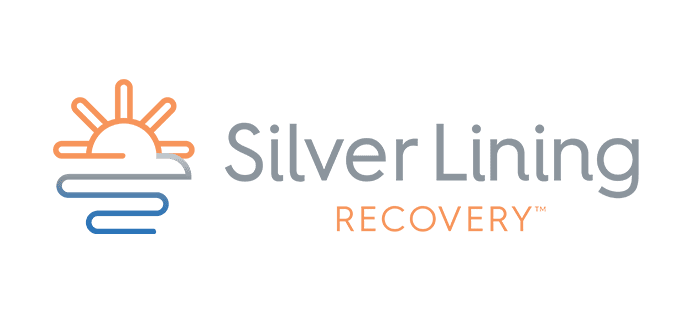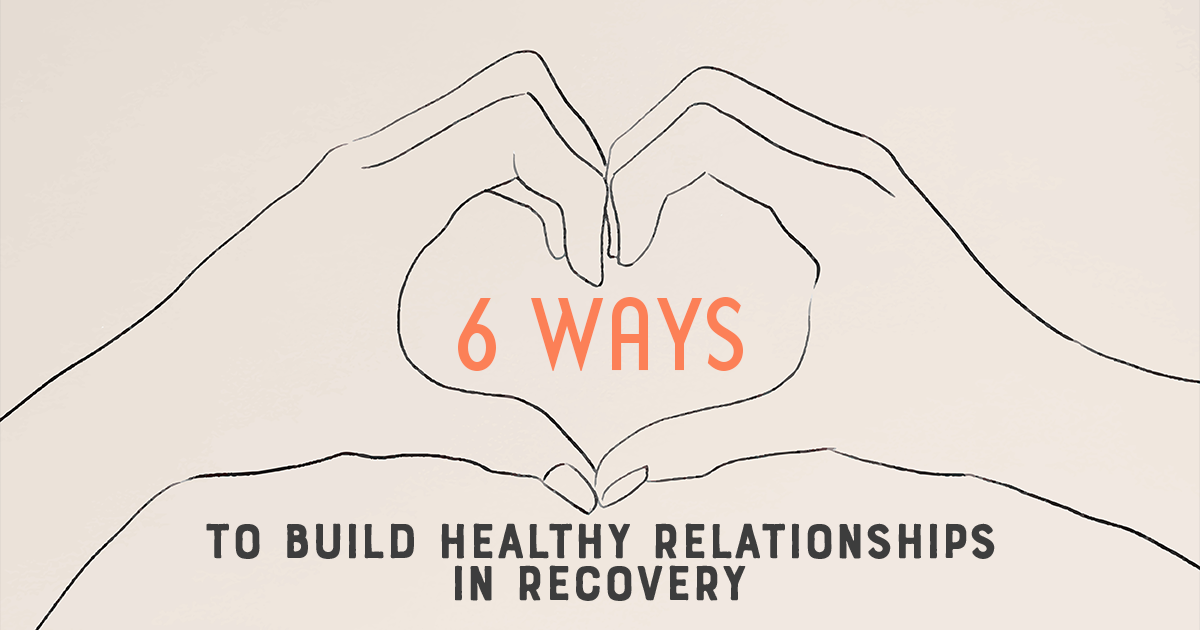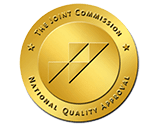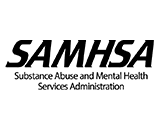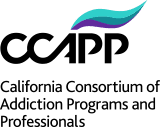Building healthy relationships in recovery is one of the more difficult parts of your journey. You may be trying to repair damaged relationships or navigating the world of relationships without the crutch of drugs or alcohol.
You can feel like you’re relearning many things or learning skills for the first time in recovery, which often includes interacting with others, whether it’s friends, family, or romantic partners.
Active addiction can be incredibly damaging to relationships of all kinds. During treatment and recovery, it’s important to understand the detrimental effects but not dwell on them. Instead, be mindful of the present moment and go from there.
Understanding the Effects of Addiction On Your Relationships
While you do have to forgive yourself and move forward, you also have to accept the impact of drugs and alcohol on every part of your life before you can do that. This impact includes how it affects the people you care about.
When you’re in active addiction, it alters your behavior. Addiction affects the brain, leading to changes in mood, behavior, and even physical health.
The longer addiction continues, the more significant the changes.
Some of the specific effects of a substance use disorder on relationships can include:
- A loss of trust—dishonesty, and deception are the underpinnings of addiction. Without trust, a healthy relationship isn’t possible. When we have trust, we enjoy relationships with others that are fulfilling and involve respect. Addicts often lie, steal and do anything needed to get drugs or alcohol. Loved ones may not understand the power of addiction and cravings, so they don’t realize that these are things that are out of your control. Working through these issues together and participating in therapy can be helpful because both sides can understand what the other was going through. You’ll often see addiction treatment plans that call for family therapy to help to repair a sense of trust and healthy communication.
- Violence and abusive behavior—unfortunately, when drugs or alcohol are involved, it increases the likelihood of violence in relationships. Drugs and alcohol can lead to a deterioration of mental health and a loss of control that contribute to violence. This doesn’t mean that everyone struggling with addiction is violent or that an abusive relationship always exists, but it’s a possibility.
- Codependency—codependency and enabling go hand-in-hand with one another. Someone who’s enabling an addict will try to remove the consequences of their actions from their life. In doing so, there’s an enabling of the addiction, unfortunately. Codependent people want to feel needed which fuels their need to try and save an addict.
- Sexual intimacy—when you’re addicted to drugs or alcohol, it impacts the ability to be emotionally and sexually intimate. It’s also a relatively common issue that when people are in active addiction, they engage in risky sexual behaviors, including cheating on a partner or not respecting the sexual boundaries of romantic relationships.
The Benefits of Healthy Relationships in Recovery
Once you decide to get help and start your recovery journey, healthy relationships are one of the most important things you can focus on outside of recovery itself. When you have strong relationships with other people, it helps facilitate your personal growth.
These beneficial relationships can help you navigate the new life you have without the influence of substances.
Having healthy, supportive relationships also improves your quality of life, and there’s a sense of support available to you when you’re struggling.
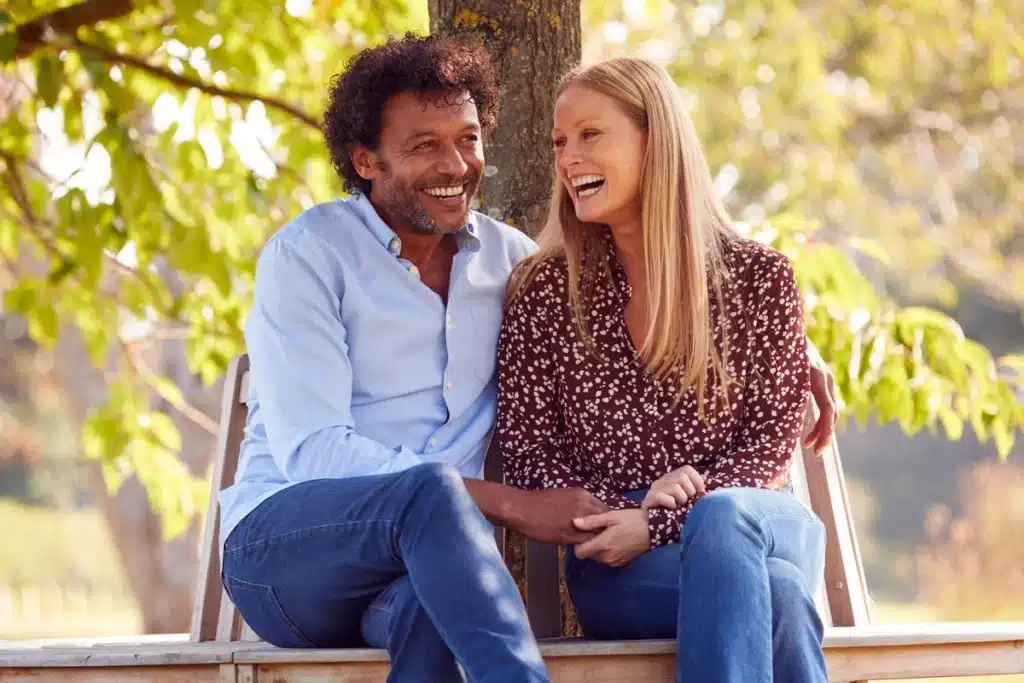
How to Start Building Healthy Relationships in Recovery
The following are six ways to focus on building relationships in recovery:
If you go to an addiction treatment program, a lot of what you’ll work on is having a healthy relationship with yourself. You need this before you can foster a good relationship with another person.
To have a healthy relationship with yourself, you’ll focus on your recovery and make sure you’re taking care of yourself physically, mentally, and emotionally.
You need to learn how to love yourself, even when accepting that you have done things you aren’t proud of.
If you’re used to toxicity or broken interpersonal relationships, you have to reestablish what it means for them to be healthy. Elements of a positive relationship include:
- Someone who supports your recovery
- Mutual respect
- Active listening on the part of both people
- Healthy, effective communication skills
- Respect for personal boundaries, including emotional boundaries
- A source of mutual encouragement
- Caring and kindness
- You feel good about yourself when you spend time with the person
- The person encourages you to achieve your best, and you do the same for them
- You feel content and at peace when spending quality time together
- Good relationships add to your life, rather than taking away from it
A good, happy relationship encourages you to be the best version of yourself in all ways.
If your goal is to rebuild an existing relationship, to move forward, you’ll need to recognize how you hurt the person when you were using drugs or alcohol.
This isn’t easy, and it requires that you take accountability and look at the things you did that you aren’t proud of. If you try to avoid these situations, you’re not going to rebuild from a place of honesty.
Many of the friends you had when you were using may still be in the place that you don’t want to return to. You can form new friendships, and do that, look in places where you know you’re going to be able to find individuals who are healthy and like-minded.
One of the great things about recovery and sobriety is that you have an opportunity to make new friends and create new types of connections. These connections can be authentic, genuine and real. They don’t need to be based around getting high and checking out. It can be scary and strange at first, but you may find amazing people who will support you during the process of recovery and maintaining sobriety. The friends and connections you make with others during recovery, can open your world up to different kinds of people and to a mindset of building yourself up and accountability. Also, when life gets difficult or challenging, having good friends who are also on the journey to recovery can provide the support you need for when something is challenging or rough. Instead of going back to old support networks and negative influences for your sobriety, you can reach out to new kinds of support and to people who will help keep you on a solid path and foundation.
Support groups like 12-step programs are a great resource to meet new people, as are religious groups and community organizations.
No matter whether you’re interested in friendships, rebuilding family relationships, or you’d like to explore dating and physical intimacy, your recovery has to come first. Good relationships with other people have healthy boundaries in place, and for you, your recovery can become that boundary.
You might, especially early on in your recovery, feel like you aren’t worthy of people loving or caring about you, and that’s completely untrue. To build positive interactions with other people, know that you are worthy, and stop negative self-talk.
You have a lot of value you can add to the lives of the people around you.
Building Healthy Relationships in Outpatient Groups in Huntington Beach, CA
It’s not an easy undertaking to begin building healthy relationships in sobriety and your recovery journey, but it will be so rewarding when you do.
Take things slowly, go at your own pace, and do what feels comfortable for you.
Be gentle with yourself, and make sure that you’re ready to leave a toxic or unhealthy relationship when necessary to replace it with beneficial ones that help you thrive and grow.
If you’d like to begin your recovery journey and get on the path to forming meaningful relationships, reach out to the Silver Lining Recovery team by calling 866-681-0927 You can’t reach your relationship goals until you meet your recovery goals and you’re taking care of yourself.
